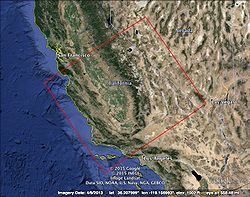Difference between revisions of "CCA"
From SCECpedia
Jump to navigationJump to search| Line 13: | Line 13: | ||
-118.2962, 39.3548<br /> | -118.2962, 39.3548<br /> | ||
-115.4454, 36.0403<br /> | -115.4454, 36.0403<br /> | ||
| + | |||
| + | The map to the right shows the bounding box of this new velocity model. | ||
The grid spacing within the model is 500m and we use trilinear interpolation in between the grid points. The model covers depths down to 50km. | The grid spacing within the model is 500m and we use trilinear interpolation in between the grid points. The model covers depths down to 50km. | ||
Revision as of 05:16, 27 March 2015
Introduction
The Central California Seismic Project model (tentatively called "CCA") is a 3D velocity model comprised of the results of the full 3D tomographic inversions done by En-Jui Lee. This technique was first introduced in CVM-S4.26, which is a SCEC southern California velocity model.
Coverage Region
The CCA model covers:
-120.0000, 33.3999
-122.9500, 36.6000
-118.2962, 39.3548
-115.4454, 36.0403
The map to the right shows the bounding box of this new velocity model.
The grid spacing within the model is 500m and we use trilinear interpolation in between the grid points. The model covers depths down to 50km.
Stand-alone Plots
Below are three horizontal slices generated from UCVM that show the new CCA model at the surface level (0km depth), 500m depth, and 2km depth.
